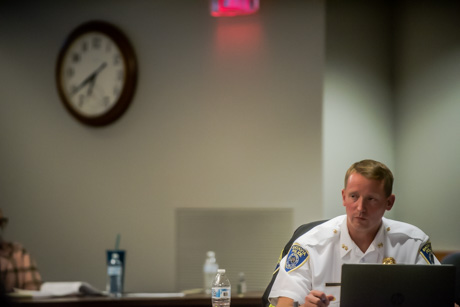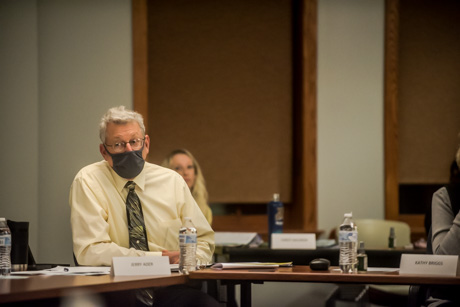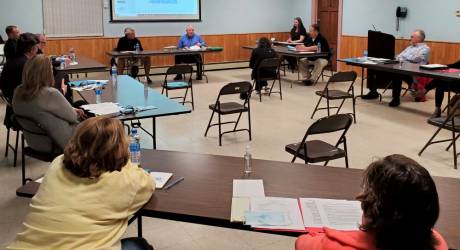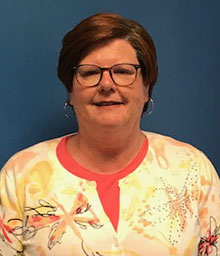Stakeholder group briefed on BPD's use of force policy

It's now a felony in New York for a police officer to use a chokehold that results in the serious injury or death of a person, but Batavia police officers who have come through the academy in the past 10 years haven't even learned that maneuver, Chief Shawn Heubusch told the city's stakeholders' group at Thursday's meeting.
Since officers aren't trained in the procedure, it isn't even mentioned in the city's use of force policy, Heubusch said.
The Batavia's Police Collaboration Advisory Stakeholder Group was formed in response to an executive order from Gov. Andrew Cuomo mandating that all municipalities with a police force form a community-based group that reviews all of a police department's policies and procedures.
Thursday meeting concentrated on Batavia's use of force policy (pdf).
Chokeholds fell out of favor more than a decade ago, but their use declined steeply after New York legislators passed a law in the wake of the 2014 death of Eric Garner. He died in New York City while in police custody and restrained in a chokehold. Even while officers continued to restrain him, Garner warned them, "I can't breathe."
As a result, the State Legislature approved the Eric Garner Anti-Chokehold Act, making "aggravated strangulation" by a police officer a Class C felony punishable up to 15 years in prison.
While the city's use of policy is silent specifically on the use of a chokehold, it does allow a police officer to use any means necessary to protect his or her life or the life of another person if somebody is in imminent danger of being killed.
An officer, for example, fighting for his or her life, could use a chokehold.
"If the officer is in serious peril, you are going to do whatever you can to prevent yourself or somebody else from being killed," Heubusch said.
The use of force policy outlines when a police officer is authorized to employ a reasonable level of force in order to effect an arrest or protect him or herself or another person, up to the use of deadly force.
Reasonable, of course, is a subjective term but a 1989 Supreme Court decision, Graham vs. Connor, provides police with a method to evaluate reasonable use of force.
What is deemed reasonable? Basically, what any other typical officer would have done under a similar set of circumstances with the knowledge the officer had the time of the incident without the benefit of hindsight. In other words, if an officer has substantial reason to believe a subject has a weapon and is likely to use it, an action taken to neutralize the ability of the subject to use that weapon is reasonable, even if it turns out later the subject didn't have a weapon.
"No policy can possibly predict every situation a police officer will face," Heubusch said. "We can't reasonably think of everything and put in a policy when there is so much judgment involved in every single action an officer takes on a daily basis."
While an officer wants to avoid or minimize the use of force, nothing in the law or policy requires an officer to retreat (unlike a civilian in a public place) in the face of a threat.
When an officer uses unreasonable force, his or her fellow officers have a duty to intervene, and a duty to report under Federal law and local policy.
"We've always had a duty to intercede in our policy," Heubusch said.
Use of force can be authorized to try and capture a fleeing criminal suspect but again, sometimes the use of force is reasonable, and sometimes it isn't. An officer wouldn't use the same force to apprehend a shoplifter that he would for a bank robber. The officer must also evaluate whether the subject is a physical threat to other people.
It's never acceptable to fire a weapon at a moving vehicle. Unlike the movies, it's rarely effective and it's a danger to others.
Deadly force is only authorized when the officer or another person is in imminent threat of death or serious injury. Imminent doesn't mean immediate, Heubusch said.
"If you point a gun at me I don’t have to wait for that trigger to be pulled," Heubusch said. "It doesn’t matter if the gun is loaded or not. We don’t have to find out if there are actually bullets in the weapon."
Anytime any level of use of force is deployed, Heubusch said, the officers must complete a report, which is another reason officers, he said, would rather avoid the use of force if at all possible.
The report is reviewed by supervisors. The information can sometimes help identify training needs and corrective measures and in rare circumstances result in disciplinary action.
"Officers hate paperwork and when they use force, they have to report it every time they wrestle with somebody," Heubusch said.
Heubusch said the use of force reports are not public even though New York recently repealed the law, Civil Rights Law 50a, which used to make records private used to evaluation police officer performance.
The reports are apparently not aggregated into any kind of statistical table.
Committee members wanted to know more about how the police department handles complaints about the possible use of force violations, particularly what protections are in place to protect an officer who cites a possible violation by a fellow officer.
Some committee members wanted to know just how thick that "thin blue line" is that supposedly protects police officers from being reported by fellow officers.
Heubusch said the department does have a whistlerblower policy that protects employees who file complaints but also noted, it's a small department -- only 33 officers on the force -- so it's hard to remain anonymous.
That being said, Heubusch added, "supervisors know what their job is. They are not going to put their careers on the line. It's their job and their living on the line. I think our officers are comfortable coming forward if they run into a situation. I have yet to uncover a problem of an officer reporting something to a supervisor."

Public Defender Jerry Ader
Top photo: Chief Shawn Heubusch
Reporting takes time and time is money. We could use more reporters to do more reporting. You can help make that happen. Please become a supporter.





